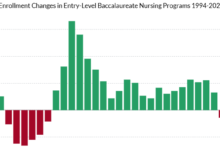New PPE and isolation rules as measles outbreaks worsen

Nurses without a measles vaccine must take up to 21 days off work if they are exposed to a patient with measles, newly published NHS England guidance has said as cases of the disease surge across the country.
This updated guidance also laid out new personal protective equipment (PPE) rules for those encountering suspected cases.
“Urgent vaccination efforts are needed to halt transmission and prevent further spread”
Hans Kluge
It stated any nurse, or other healthcare worker, exposed to measles must be sent home from the fifth day after their first exposure until 21 days after their final exposure.
This rule applies to any healthcare worker who has face-to-face contact of any length with a person with measles, or if they spend more than 15 minutes in a “small, confined area” with a measles patient.
Workers who have had two doses of the measles, mumps and rubella (MMR) vaccine, can prove immunity with a postive measles antibody test, or were wearing appropriate PPE at the time of exposure do not need to take time off work unless they begin to develop rash or fever symptoms.
Symptomatic healthcare workers with vaccine coverage or antibodies must be excluded from work until four full days after the onset of a rash associated with measles.
The updated guidance specified that all staff – vaccinated or otherwise – must wear “appropriate” PPE when coming into contact with confirmed or suspected measles.
It specified that appropriate PPE must include goggles or visors, respiratory protective equipment (RPE) and single-use disposable gloves and apron.
Patients with suspected measles, under the guidance, should wear a surgical facemask in communal areas if it does not compromise their clinical care.
The guidance also stated that patients should be isolated until their symptoms have subsided or until nine days have passed since the onset of a rash associated with measles.
NHS England further stated that organisations should work to ensure unvaccinated staff are fully immunised against measles, that patients are being screened and isolated if necessary and that they are creating respiratory season or winter plans.
As well as this, organisations were told to train staff in the correct use of PPE, to make sure fit testing is completed for staff who may require RPE and to perform risk assessments for staff at high risk of infection or complications from measles.
The updated guidance has been published as outbreaks of measles continue to be reported across the UK and beyond, largely attributed to waning MMR vaccination rates.
In the West Midlands, there have been more than 200 confirmed cases and more than 100 probable cases since 1 October 2023, with 80% of these being reported in Birmingham.
Outbreaks have also been reported in London and Cardiff in recent months.
The UK Health Security Agency (UKHSA)’s most recently-available national figures, covering January-November 2023, showed that London and the West Midlands were the country’s hotspots.
During this period, 104 cases were confirmed in London. The majority of these (63) were in children aged 10 or younger.
As a result of the outbreaks across the past year, NHS England and Public Health Wales both recently launched campaigns to improve immunisation uptake rates.
Infection rates of measles have also surged outside of the UK.
World Health Organization (WHO) data shows that Ethiopia, Yemen, Kazakhstan and India have all reported more than 10,000 confirmed cases between June -November 2023.
In addition, today, the WHO reported an “alarming” 30-fold increase of measles cases across Europe in 2023 compared to 2022.

Hans Kluge
WHO regional director for Europe, Dr Hans Kluge, said “urgent measures” must be taken to avoid further spread.
“We have seen in the region not only a 30-fold increase in measles cases, but also nearly 21,000 hospitalisations and five measles-related deaths. This is concerning,” said Dr Kluge.
“Vaccination is the only way to protect children from this potentially dangerous disease. Urgent vaccination efforts are needed to halt transmission and prevent further spread.
“It is vital that all countries are prepared to rapidly detect and timely respond to measles outbreaks, which could endanger progress towards measles elimination.”
The WHO pointed out that many countries where, previously, measles had been declared eliminated, had begun to report outbreaks in 2023.
The organisation reiterated that all countries must achieve and maintain 95% vaccination coverage of two doses of a vaccine containing measles.




